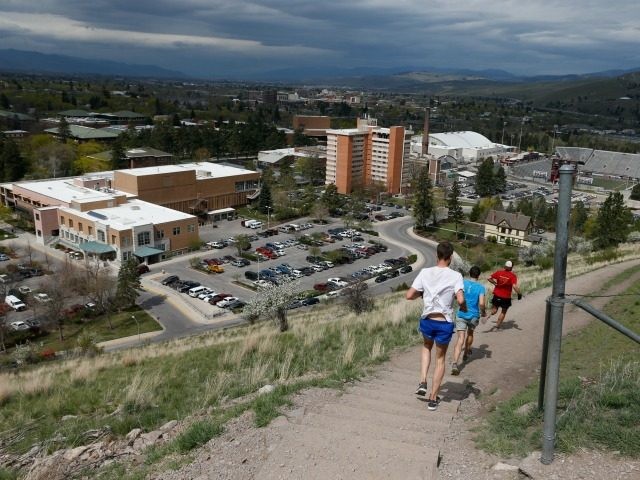President Barack Obama’s administration has resettled 46 refugees in Missoula, Mont., since August, according to the Department of State’s interactive website.
Local opposition to the influx of refugees has been loud and vocal, but the Obama administration and the local voluntary agencies (VOLAGs) who are being paid to settle the refugees appear indifferent to what the majority of Montana residents prefer.
Instead, they appear to be responding to the political leadership of Missoula County, home to the University of Montana. It is the second most populous county in the state with 109,000 residents, and one of only six counties in Montana that voted for Hillary Clinton over Donald Trump.
Trump defeated Clinton in the state by a 56 percent to 36 percent margin, but in Missoula County, Hillary Clinton won by a 53 percent to 37 percent margin.
The Missoulian reported that “Missoula County commissioners touched off a firestorm when they sent a letter to the U.S. State Department last winter saying they’d welcome the resettlement of 100 refugees a year to deal with the worldwide crisis, which has reached proportions not seen since the aftermath of World War II.”
Outside of Missoula County and Democratic Governor Steve Bullock, there is strong opposition to the resettlement of refugees in the state.
In Flathead County, whose 90,000 residents make it the fourth most populous county in the state, where Donald Trump won by a 65 percent to 29 percent margin, the “County Commission voted unanimously [in March ] to send a letter to the federal government explicitly opposing refugee resettlement in Flathead County,” The Flathead Beacon reported, noting that local opposition to refugee resettlement was virtually unanimous:
A standing-room-only crowd gathered at the commission’s office in Kalispell for the March 10 meeting, with members of the public offering comment on the situation for about 15 minutes.
Everyone who spoke opposed refugee resettlement here, with concerns of Sharia Law and the country’s vetting process sprinkled through the comments. John Donoghue said he supported the commission’s letter, and that while he is sympathetic to those who have lost their homes and livelihoods to war, he doesn’t believe they should settle in the U.S. without thorough background checks.
Of the 46 recently resettled refugees, 27 come from the Democratic Republic of the Congo, 12 from Eritrea, 4 from Iraq, and 3 from Ethiopia.
No refugees were resettled in the state for more than three full years between October 1, 2012 and July 31, 2016. Prior to that, only one refugee was resettled in FY 2012. None were resettled in FY 2010 and FY 2011, and seven were resettled in FY 2009.
But that all ended in August when the first of the refugees invited by the Missoula County Commissioners, approved by the Department of State, and managed by the International Rescue Committee and a local group called Soft Landing Missoula, arrived in the state. The Associated Press reported:
An exhausted Congelese family of six experiencing culture shock has arrived in Missoula, the first of an anticipated 100 east African refugees expected to be resettled in Montana over the next year, a resettlement agency official said.
The family arrived last Thursday and International Rescue Committee Missoula director Molly Short Carr declined to identify them because of privacy concerns, but said three of the family’s four children spent their entire lives in a Tanzanian refugee camp.
“You’re going to see them in the community and know they’re here, but at the same time we need to remember they are individuals and may not want this information shared,” Carr told the Missoulian in a story published Saturday.
The family has been placed in temporary housing. The IRC will help them apply for social services, Social Security cards, register the children for school and help the parents enroll in English classes. The parents speak Swahili and French.
The resettlement of refugees in Montana played a significant role in the state’s Gubernatorial election, as the Associated Press noted:
The same week the family arrived in Missoula, Republican candidate for governor Greg Gianforte began mailing out fliers urging a halt to refugee resettlement in Montana.
One of the fliers shows Gianforte’s opponent, Democratic Gov. Steve Bullock, pictured under an armed man whose face is covered by a kaffiyeh with the words, “Governor Bullock supports bringing Syrian refugees into Montana.”
The flier calls for stopping “any refugee resettlement until we know they can be properly vetted.”
In November, Bullock narrowly defeated Gianforte, 50 percent to 46 percent and retained his job as governor, one of the few bright spots around the country for Democrats in the November elections.
Bullock’s support for the refugee resettlement program presents a signficant hurdle for state legislators who wish to limit it or shut it down entirely.
In other states, such as Texas, New Jersey, and Kansas, governors have recently withdrawn from the federal refugee resettlement program, paving the way for a potential Tenth Amendment lawsuit similar to the one Tennessee is about to file in federal court.
With a cooperative governor in Montana, the Obama administration and resettlement agencies may feel emboldened to resettle as many refugees as possible prior to January 20, when Donald Trump will be inaugurated as the 45th president of the United States.
Trump promised on the campaign trail he will pause the resettlement of refugees from Syria and other states hostile to the United States once in office.
It is unclear if the Democratic Republic of the Congo, Eritrea, and Ethiopia and Iraq will fit that standard, but they may.
The push to resettle refugees in Montana comes as the Obama administration has doubled the number of refugees resettled in the entire country during the first three months of FY 2017, compared to FY 2016.

COMMENTS
Please let us know if you're having issues with commenting.